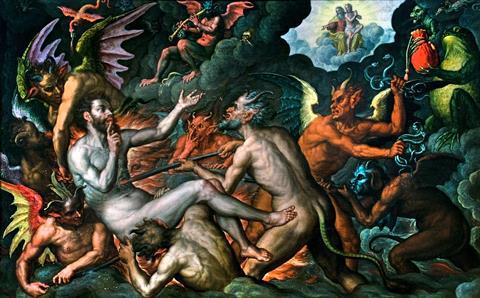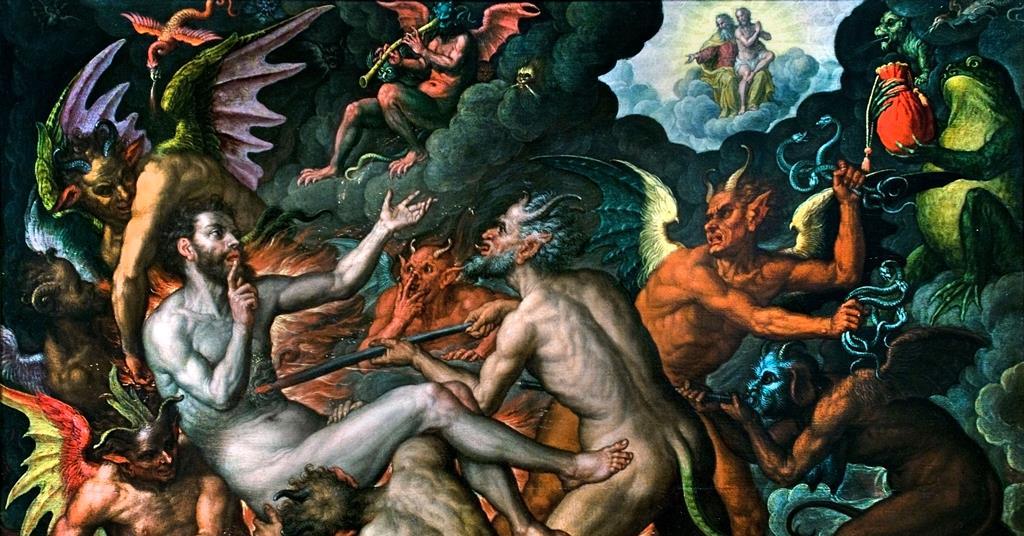Premier Christianity uses cookies Read our cookie policy.
By 2025-09-29T08:24:00+01:00
Paul Marston challenges the traditional Christian view of hell as eternal conscious torment, arguing that scripture actually teaches the complete destruction of the unrepentant rather than unending suffering
Source: Peter Horree
The rich man in hell 1624
It was lovely to read an article in this magazine from the faithful Christian leader RT Kendall who has just turned 90 years old.
RT fears the Church in the UK is asleep and needs to recover sound, biblical doctrine.
In his piece, RT claimed “many” Christians have “run to the teaching of annihilation (that one consciously ceases to exist after death)” and are abandoning the reality that people will suffer eternal conscious torment in hell.
I share RT’s desire for Christians to be biblically faithful. But what if we’ve misunderstood and misinterpreted what the biblical writers actually claimed about life after death?
Christians have a natural concern to know what is the final destiny of friends and loved ones who died without faith. To those of us who believe the Bible to be authoritative and inspired this will not be determined by what we want to be true but by what the Bible teaches.
The New Testament teaches throughout (John 5:28–29; Romans 2:5–8; 2 Corinthians 5:10–11; 2 Thessalonians 2:1-3; 2 Peter 3:7; Revelation 20:12–13) that there will be a resurrection of the righteous and unrighteous, and a final judgment. Those who have faith in Jesus and his sacrifice will have eternal life, but what of those who do not?
The traditional view is hell will mean unending torment without hope for the unrepentant.
Throughout history, however, some have understood the Bible to say that the ‘eternal punishment’ such will receive is eternal destruction, a ceasing to exist that is everlasting.
This is not because they want to move away from Bible teaching, but because this is the most obvious understanding of what it says, and an increasing number of evangelical scholars have accepted this.
First, we should look at the background of Jewish thinking at the time of Jesus, the meanings of words used, and what is actually said. Between death and the resurrection is hades (sheol in the Old Testament), and Christians differ over whether those there are fully conscious, partly conscious or unconscious. Whichever is correct it is temporary, and the real issue is what happens at the final judgement.
The two key biblical words are ‘eternal’ (aionios) and ‘destruction/perish’ (appolymi/apōleia). Sodom and surrounding cities suffered “the punishment of eternal fire” (Jude 1:7), they were “destroyed” by fire and sulphur from heaven (Luke 17:29) and “burnt to ashes” making them “an example of what will happen to the ungodly” (2 Peter 2:6). The fire was “eternal” meaning other worldly, but the “destruction” led to the cities and inhabitants ceasing to exist as entities. Their suffering was not unending, though the smoke of their destruction rose as a memorial of what had happened (Genesis 19:28, compare Revelation 14:11, 19:3).
The biblical word for “destroyed” can sometimes be used metaphorically. In Luke 15:24 the father says his prodigal son was “dead and is alive, he was destroyed and is found”, but the son was neither literally dead nor literally destroyed.
Whenever there are plain statements of what happens to the finally impenitent at the last judgement it is a judicial destruction/perishing, never unending torment. This is apparent throughout the New Testament, including in John 3:16: “For God so loved the world that he gave his only son that whoever believes in him should not perish (apolētai) but have eternal life.” It does not say “whoever believes in him should not be eternally consciously tormented but have eternal life.”
Jesus is explicit in Matthew 10:28 about what happens in hell (Gehenna): “do not fear those who kill the body but cannot kill the soul. Rather fear him who can destroy (apolesai) both soul (psychēn) and body in hell (Gehenna).” It is not just the body but the whole being that is destroyed by the eternal fire of God.
Jesus’s term Gehenna and its graphic image reflect Isaiah 66:24 where bodies are consumed by unquenchable fire and maggots, and those involved are destroyed and cease to exist. They do not suffer unending torment.
Paul also reflects this in 1 Corinthians 15:13-18: if there is no future resurrection from the dead, then those also who have fallen asleep in Christ have perished (apōlonto) – they have permanently ceased to exist.
So where does the idea of unending torment come from? Could it be in Jesus’s parables? Great care must be taken not to press details in parables to meanings beyond the central point(s) of the parable. Jesus told various parables specifically to encourage his followers to remain faithful and to be ready for his second coming. The five unready virgins are shut out of the celebration (Matthew 25:1-13) the worthless servant thrown into the darkness (Matthew 25:30), as is the wedding guest who is not dressed well (Matthew 22:11-13). There is lament and anger about missing out, but there is no indication of unending torment.
Conservative commentators on Revelation all warn that it is not easy to decipher the meanings in some of its vivid pictures. ‘Death’ and ‘Hades’ are personified, and cast into the lake of fire (20:14) meaning that they cease to exist because “death shall be no more” (21:4). In the next verse those whose names are not in the book of life will be thrown into this same lake of fire – meaning that they will be destroyed and exist no more. In 20:10 it is Satan who is tormented, the humans in 20:9 are totally consumed by the eternal fire.
The only place in the whole of the Bible that could be taken to indicate unending human torment is Revelation 14:10-11.
This says that those with the mark of the Beast: “will be tormented with burning sulphur in the presence of the holy angels and of the Lamb. And the smoke of their torment will rise for ever and ever. There will be no rest day or night…” In my book Hellfire and Destruction I noted that G K Beale, a leading scholar (who believes in unending torment) has stated that the Greek structure of “day and night” here may mean quality of time not unending time. It says the smoke of this torment will rise forever, but it does not say that their torment will continue forever.
In Genesis 19:28 the rising smoke is a memorial of the fiery total consumption and obliteration of Sodom. Likewise, ‘Babylon’ will be totally obliterated but the smoke of this destruction will rise forever (Revelation 19:3). So, a single ambiguous verse (14:11) in a complex apocalyptic book should not be used to deny the repeated plain New Testament statements that the eternal punishment of the unrepentant in the last judgement will be destruction in the all-consuming fire of God.
All of us who believe in the inspiration of the Bible should want to understand what it says on these issues. This is both in order to know what may happen to friends who die without faith, and also to understand more about our God who is love, light and a consuming fire.
Hellfire and Destruction: What Does the Bible Really Say about Hell? by Paul Marston is available now
Grab this Deal!
We’re celebrating a remarkable journey from our humble beginnings as Buzz in the 1960s to the vibrant, multi-platform publication we are today. One thing has remained constant: our commitment to connecting faith with the world around us. To celebrate our birthday, we are offering you a Print and Digital subscription for just £24 your first 12 months!
Subscribe Today
*Offer applies in UK only, but check here for our overseas offers
2025-10-28T16:29:00Z
Dr Beth Allison Barr’s academic research brought her into conflict with the teaching of the church she grew up in. In this interview, she explains why she believes the prohibition of female church leaders is a modern phenomenon, not a biblical mandate
2025-10-22T16:22:00Z
Waiting is rarely easy. It may bring disappointment, impatience and even lament, but it’s an essential part of being a Christian
2025-10-22T15:41:00Z
Chat GPT hasn’t even celebrated its third birthday, yet this powerful technology is already rewriting the rules of work, creativity and even worship. Sam Hailes convenes a panel of experts to consider what the rapid rise of AI means for the future of the Church
2025-11-06T15:20:00Z
In a week marked by prayer and worship In Israel and prophetic declarations at the Gaza border, Chip Kendall says he witnessed God’s divine orchestration in the release of hostages held by Hamas
2025-11-06T09:10:00Z
Michael Toms was convicted on nine counts including rape and indecent assault of two girls. Having attended the sentencing hearing, Susie Leafe says his case reveals the same troubling dynamics of abuse seen across other church denominations
2025-11-05T14:36:00Z
After their eldest daughter made a false report at school when they refused her request for a phone and makeup, Christian couple Daniel and Bianca Samson were accused of “religious extremism” and had both daughters seized by the Swedish authorities. However shocking, ADF’s Guillermo Sancho says such a case is not an anomaly across Europe
Site powered by Webvision Cloud

